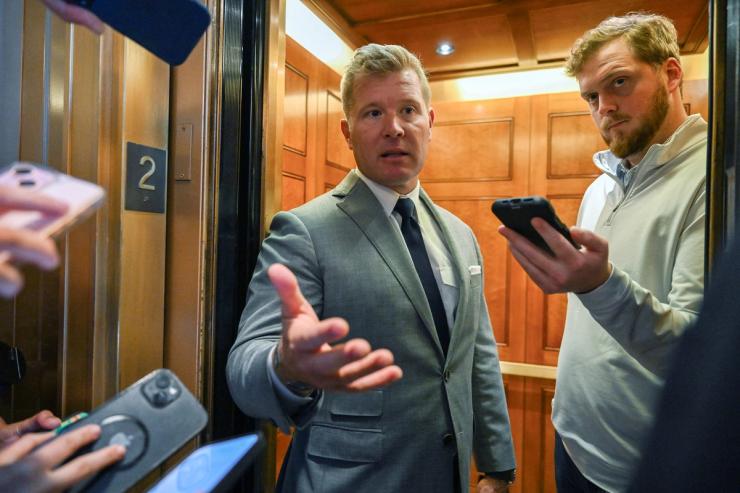The News
Jared Isaacman’s comeback bid to lead NASA got behind-the-scenes help from a rare figure in Donald Trump’s Washington: a Republican senator willing to play hardball with the White House.
Montana Sen. Tim Sheehy tried unsuccessfully in May to get President Donald Trump to reconsider his withdrawal of Isaacman’s nomination to lead the space agency. After months passed with still no permanent NASA nominee, Sheehy, a longtime friend of Isaacman, identified a key piece of leverage: the confirmation of a close Trump ally.
In order to get outgoing personnel chief Sergio Gor quickly approved as US ambassador to India, the president needed all 53 GOP senators to go along. But Sheehy suggested he wouldn’t view Gor’s job of staffing the administration as complete as long as the NASA role was vacant.
So Sheehy put a hold on Gor’s nomination in September, a move that has not been previously reported. It didn’t take long to get a response from the White House.
“We’ve been talking to the administration on many different fronts, and getting a lot of head nods, but there’s nothing happening,” Sheehy recalled in an interview with Semafor. “We put a hold on him. And all of a sudden, phones are blowing up.”
It was a perilous play. Gor is one of Trump’s most loyal advisers, and slowing down his nomination could have backfired. But the way Sheehy handled the NASA confirmation also reflects his philosophy on political risk, which he summed up later in the interview: “Let’s not go public on stuff that’s dividing us.”
Sheehy kept his hold private in September, and his strategy worked. Vice President JD Vance quickly called him to defuse the situation; he told Vance that the lack of a permanent NASA chief was a “huge problem.” The two came to a deal: Sheehy would release his hold in exchange for the administration redoubling its efforts to fill the position.
Then, in an almost unheard-of reversal, Trump renominated Isaacman last week. It was a huge moment for Sheehy, a former Navy SEAL, aerial firefighter, and rancher who defeated longtime Democratic Sen. Jon Tester last year.
Though Sheehy said he’d be open to other NASA nominees, he saw Isaacman as ideal: a self-made man who’d become a private astronaut, and was willing to put all that on hold to rebuild NASA.
“The fact that he would be willing to step away from the life of a multi-billionaire running a multibillion-dollar company doing whatever the hell he wants every day, to become a government employee,” Sheehy said, is “testament not just to his character, but also the fact that he’s the right kind of guy we need there.”
Know More
This year’s fast pace has forced Sheehy to lean on his experience before politics, from responding to the California wildfires to fending off forced public land sales. He’s also brokered a peace deal on beef prices after an imports battle threatened to fracture Trump’s coalition.
That’s on top of raising four children, all home-schooled (sometimes in his Senate office). Sheehy is a fast-talking, cerebral 39-year-old who may have only one thing in common with his Democratic predecessor: regular usage of profanity.
Sheehy dropped four F-bombs in a 40-minute interview, calling a Superfund site in Butte, Mont., “a f*cking toxic pit of death” and Isaacman a “f*cking genius.”
Isaacman was caught up this year in a larger battle between Elon Musk and Trump loyalists; his ties to Musk derailed his nomination. A few months later, with Transportation Secretary Sean Duffy installed as acting NASA chief, Sheehy concluded that Duffy was a fine placeholder who couldn’t stay forever.
“They said, ‘well, Sean’s got us.’ And that’s not good enough. I like Sean. I’ve got no issue with him,” Sheehy said, adding that NASA “is not a part-time job. Nor is it a job for some staff member to get kicked over there and oversee this thing.”
Isaacman told Sheehy that despite the withdrawal, he’d still be interested.
“When Jared’s nomination was pulled the first time, it had nothing to do with Jared,” said a person familiar with the nomination. “It had everything to do with Sergio trying to extract a pound of flesh from Elon.”
Sheehy’s campaign to prioritize NASA is driven by a more existential worry: that China will outcompete the US in space.
“We’re so comfortable on our laurels here in America now, from our superpower status for our military to our space to our economy,” Sheehy said. “I hate when people get comfortable like this.”
Step Back
Sheehy’s restlessness has played out closer to Earth, too.
Republicans saw their shutdown unity disrupted last month as Trump floated a plan to bring down beef prices by quadrupling imports from Argentina. That sent domestic cattle markets plunging and Plains-state Republicans into a tizzy, with many complaining publicly about the president’s plans.
That’s when Sheehy deployed his no-public-divisions strategy. Republicans were “totally on board” with Trump’s interest in lower prices, he said: “This wasn’t a policy disagreement. This was a sequencing disagreement.”
He asked the president for time to consult with Agriculture Secretary Brooke Rollins, Interior Secretary Doug Burgum and other Republican senators. Last week, Sheehy went to the White House with Sens. Markwayne Mullin, R-Okla., and Cindy Hyde-Smith, R-Miss., armed with polling data showing the popularity of US ranchers and beef.
After the meeting, Trump announced a crackdown on meatpackers. A senior White House official said Sheehy has been “extremely helpful to the Trump administration and will continue to be an invaluable asset for Republicans in the Senate for years to come.”
Of course, it’s not always possible for Sheehy to keep his disputes private.
The freshman senator took his first big risk of the year by publicly sinking a plan from Sen. Mike Lee, R-Utah, to sell public lands. He understood where Lee’s bid to attach the public lands sales to the GOP tax bill came from: Utah needs more land for its cities to grow.
But Sheehy also knew that his Montana House colleague, Rep. Ryan Zinke, was going to vote against the tax bill if they included it. Sheehy threatened to vote no, and the provision was dropped.
The bill “was gonna go down because of some random-ass public lands rider thrown in at the last minute that no one’s even read,” Sheehy recalled. “A stupid risk.”
Room for Disagreement
Sheehy isn’t always a classic Trump loyalist, smoothing over differences within his party. Lately he’s been dialing in on his work with Sen. Elizabeth Warren, D-Mass., to change the way the United States procures Pentagon assets.
He scheduled meetings with every senator he could when he first took office, and he and Warren immediately hit it off on the issue.
“It’s an absolute crime how we’re positioning our men and women in uniform,” Sheehy said. “They’re gonna hit the beach in Iwo Jima or Saipan or Taiwan or whatever the hell is we send them next, and we’re gonna quickly find out we’re not the big badass[es] we thought we were.”
He also works with Democrats like Sen. Alex Padilla of California on fighting wildfires.
Although “we all loved Tester,” said Sen. Peter Welch, D-Vt., whose office is across the hall, “I’ve found [Sheehy] easy to interact with and just straightforward and down to earth and practical. I think this fire legislation he did is pretty good.”
Burgess’s view
Sometimes it’s hard to tell how effective a junior senator like Sheehy is: He usually walks outside the Capitol halls, away from the press, and he’s not omnipresent on TV like some of his other ambitious colleagues. That’s why Sheehy’s interview with me was so interesting: He was willing to talk about how — and why — he took risks to achieve his goals.
Sheehy’s fellow first-term Republicans are showing off different approaches to Trump-era governing, with two poles in the brash and aggressive Sen. Bernie Moreno, R-Ohio, and the more businesslike quiet of Sen. David McCormick, R-Pa.
Sheehy falls somewhere in between the two.
Notable
- We at Semafor first reported on Isaacman’s withdrawal in May.


